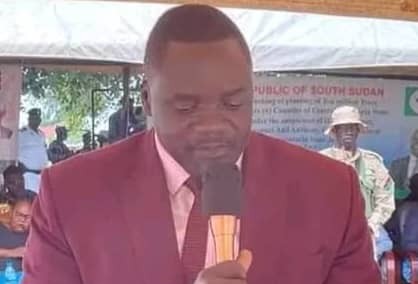
South Sudan stands at a pivotal crossroads. As the nation grapples with the lingering wounds of conflict, political mistrust, and institutional fragility, one question looms larger than ever: What legacy are we building for the generations that will inherit this land?
For the South Sudan National Movement for Change (SSNMC), under the leadership of Hon. Moro Isaac Jenesio, the answer is clear — the future must not be defined by the failures of the past. SSNMC envisions a peaceful, democratic, and united South Sudan where every citizen enjoys security, dignity, and opportunity — not only today, but for decades to come.
Our vision rejects the short-termism that has long dominated the country’s politics. We believe the struggle for peace, justice, and transformation must outlive any single leader or political cycle. It is about planting the seeds of a new political culture — one rooted in integrity, service, and collective responsibility — so that future generations inherit a nation stronger, fairer, and more united than the one we found.
Laying the Foundations of a Generational Vision
SSNMC’s roadmap is built on concrete pillars — each aimed at reshaping the foundations of South Sudan’s political, social, and economic life.
1. Lasting Peace through Unity and Reconciliation
The future must not inherit the divisions of the past. Our commitment is to heal old wounds by fostering truth-telling, forgiveness, and national cohesion. We envision a country where no child is taught to hate — but to hope.
2. Institutional Integrity and Rule of Law
Lasting peace requires strong, transparent, and independent institutions that serve the people — not those in power. Justice must be accessible to all, and the law must apply equally to every citizen, regardless of status or affiliation.
3. Security Sector Reform and a Unified National Army
True security belongs to the people, not political factions. Our vision is for a professional, apolitical, and unified army under one national command — a force that protects the constitution, not party interests.
4. Democratic Governance and Legitimate Leadership
The legitimacy of leadership must come from the ballot, not the barrel of a gun. We stand for free, fair, and credible elections, term limits, political pluralism, and peaceful transitions of power. Democracy is not just a principle —it is the foundation of lasting stability.
5. Inclusive Development and Economic Justice
No South Sudanese should be left behind. Regardless of tribe, region, gender, or background, every citizen deserves education, healthcare, clean water, and economic opportunity. Our nation’s wealth must serve all, not a privileged few.
6. Empowering Youth and Women
Generational change is impossible without the full participation of youth and women. They are not just leaders of tomorrow — they are leaders today. SSNMC is committed to ensuring they have a decisive role in governance, peacebuilding, and economic life.
7. Decentralization and Local Empowerment
Real change must begin from the ground up. Strong, autonomous local governments are better positioned to understand and address the needs of their communities. Power must move closer to the people.
A Legacy for the Future
We refuse to pass down conflict, corruption, and despair to the next generation. Instead, we aim to pass on functioning institutions, a nation at peace with itself, and a political culture built on accountability and truth.
This is more than a political agenda, it is a generational promise. It is a pledge to future South Sudanese that their country will not be trapped by the mistakes of yesterday. Instead, it will rise as a beacon of peace, democracy, and shared prosperity.
Disclaimer: The opinions expressed in this article are solely those of the author, Hon. Mogga Charles, Secretary for Foreign Affairs of the South Sudan National Movement for Change (SSNMC), and do not necessarily reflect the views of SZN or any other publication.

